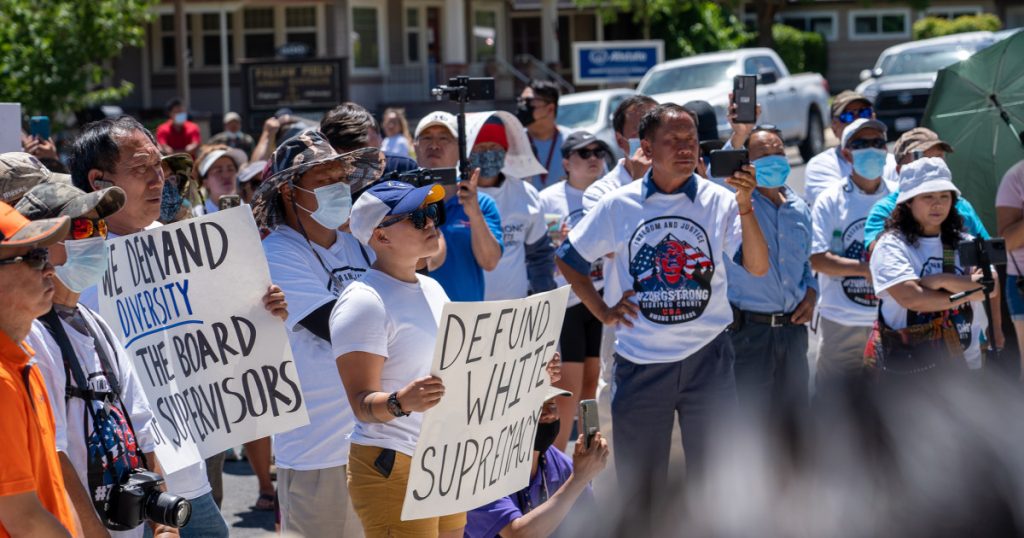

Many Asian American activists and community members in Siskiyou County, California, are celebrating a win in their fight against local water regulations that they say have led to discrimination and restrictions on human rights.
The Siskiyou County Board of Supervisors repealed a pair of water ordinances last week that barred water trucks — defined as vehicles that can carry about 100 gallons of water — from transporting water without permits as part of a settlement of a 2021 case that accused the county of having cut off the Asian American community members’ access to water. Many Hmong and other Asian Americans, who previously argued that the policies were disproportionately enforced in their communities and led to racial profiling by local authorities, spoke out in support of reversing the ordinances.
“My neighbors and I have been forced to make impossible choices between bathing every week and providing water to our pets, livestock, and gardens,” Siskiyou County resident Russell Mathis said in a news release about the repeal. “Today, we celebrate an important victory affirming our human right to water and our rights to live without oppressive fear and trauma, simply because of where we were born or what we look like.”
County Board of Supervisors member Nancy Ogren declined to comment, and the four other members of the board did not respond to requests for comment.
The Board of Supervisors also revised a third ordinance, establishing due process and a $2,500 limit on fines. The ordinances were repealed after years of clashes between the Asian American community and local authorities.
The ordinances, first passed as an emergency measure in May 2021, were in part an effort to curb illegal cannabis farming. While growing cannabis is legal in the state, the county heavily limits the number of plants permitted on a property and forbids outdoor growing altogether. However, many Hmong and Chinese community members, who are part of the county’s farming population, said the measures were largely enforced in Asian American areas, lawsuits allege.
Kao Ye Thao, the director of policy and partnerships at Hmong Innovating Politics, a grassroots civic engagement organization based in California, said in 2021 that multiple Asian community members reported having been harassed or stopped by law enforcement while they were driving.
“The ordinance itself was an emergency ordinance passed without really consulting with the community that it was actually going to be targeting. … Now they’re associating being Asian with being an illegal cannabis grower,” Thao said.
In June 2021, tensions rose between the Asian American community and local authorities when four officers from different agencies, including the sheriff’s department, shot and killed Soobleej Kaub Hawj, a local farmer, during a fire evacuation. The sheriff’s department said Hawj pointed a semi-automatic handgun as the officers entered an evacuation zone after he “ignored numerous directions by officers and attempted to drive around the roadblock,” but activists and community members have questioned the sheriff’s account, particularly after a witness said more than 60 shots were fired at Hawj. The district attorney announced last year that the officers will not face charges, writing in a letter to law enforcement agencies explaining his decision that Hawj pulled a handgun and pointed it at a law enforcement officer, prompting other officers to open fire.
In addition to acting in the 2021 case, Asian American residents filed a class-action lawsuit in August 2022 accusing the county of large-scale harassment of Hmong residents. They accused county officials, in part, of restricting their right to water, executing unlawful traffic stops and engaging in unlawful search and seizure practices to drive people of Asian descent from the area.
According to the class-action suit, while Asians are only 2.4% of the county’s adult population, they accounted for over 28% of sheriff’s department traffic stops in 2021.
“This targeting is designed to drive a disfavored racial minority from the County and has its roots in anti-Asian racism in Siskiyou dating back to the 1800s,” said the lawsuit, filed by the ACLU Foundation of Northern California and the activist group Advancing Justice-Asian Law Caucus.
Sheriff Jeremiah LaRue did not respond to a request for comment. He told The Guardian last year that “we don’t target any people. We target crime. It’s unfortunate that is sort of the card that’s being played.”
The lawsuit also described everyday discriminatory behavior toward the Hmong population.
“In one striking example, the Board singled out Hmong attendees at a 2015 public meeting, calling first for a show of hands from ‘the Hmong residents’ on the issues presented, and then calling for a vote of ‘those County residents present,’ as if the Hmong people were outsiders,” it said.
Those pursuing the class-action lawsuit are in settlement negotiations, according to the Advancing Justice-Asian Law Caucus.
For now, the repeals represent a victory for the Asian American residents in the community, advocates say.
“As the Asian American community in Siskiyou has grown, including more parents enrolling their kids in school, grandparents retiring to more rural areas that remind them of Laos, and families trying to be closer together, Siskiyou County and the Sheriff’s Department have gone to troubling lengths to push out the Asian American community,” said John Do, a senior staff attorney for the Racial & Economic Justice Program at the American Civil Liberties Union of Northern California, in a press release. “And community members are taking action to create a safe, inclusive place to live.”

 Latest Breaking News Online News Portal
Latest Breaking News Online News Portal




